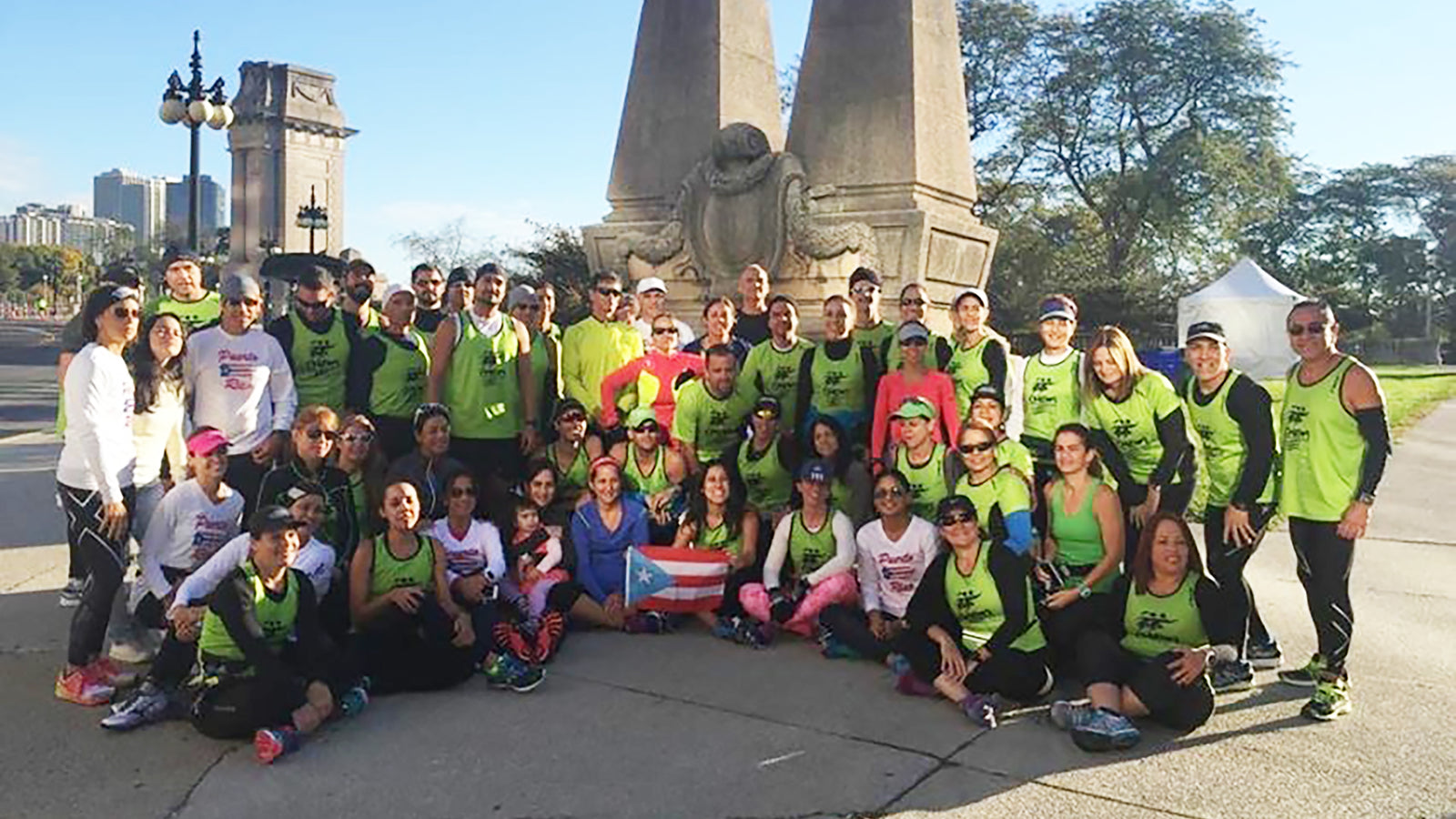Written by Hannah Mladenovich
Similar to the Super Bowl, World Cup, and World Series–each sport has that motivating threshold where it’s not only an honor to win, but extremely gratifying just to be a part of. These events, regardless of the sport, means that they can prove not only to the world, but also themselves, that they have made it.
In the world of marathon running, a similar goal exists. TheAbbott World Marathon Majors consists of six of the largest and most renowned marathons in the world where competitors from all over come to compete. Although marathons are somewhat an individual sport, the physical and mental toll on the body and mind makes it arguably one of the most challenging, but also rewarding experiences. Many people, including athletes, have said the words “I could never run a marathon” and due to its intensity, not a lot of people have tried. Those who complete even just one marathon are often left feeling more confident, fulfilled, and proud of themselves. Those who go on to compete in the big six–well, that feeling is unlike any other–almost Super Bowl status.
We spoke with Enrique Rivera– a marathon runner who has completed four marathons of the big six and has his final two coming up within the next year. Enrique shares with us his experiences with running as well as an inside look of what it takes to compete at this level and what has molded him to this point.
About Enrique: How it Started
Enrique started his running career in high school as a way to keep up with physical maintenance and to stay in shape. As a kid, he grew up watching his dad run which really motivated him to pursue running even though it started off casually. As he continued along that path, he and his dad really started to bond over the process and eventually started running together. This helped them to motivate and support each other a little more competitively. “It grew on me really quickly,” says Enrique “my dad became my motivation and now when I run, I always talk to my dad about the times I am doing, how I am training, and how I am progressing which is really refreshing and nice to have.”
Fast forward through college and starting a family, he joined a running club in 2014 where he was able to expand his running network, train more intensely, and surround himself with like minded people who shared his same interest and passion for running. “In addition to running to stay healthy,” says Enrique, “I do it as a way to maintain my competitiveness and mental stimulation.” He enjoys challenging himself especially when it comes to self-improvement such as his own personal time and qualifying for high-ranking marathons.

Enrique and the Abbott World Marathon Majors:
As mentioned before, the Abbott World Marathon Majors is like the World Series to the running community. Completing this series is considered the ultimate accomplishment to receive– not necessarily from a “winning” perspective, but from a finishing perspective. These races take place in 6 major cities throughout the world which include:The Tokyo Marathon, theB.A.A Boston Marathon, theTCS London Marathon, theBMW-Berlin Marathon, theBank of America Chicago Marathon, and theTCS New York City Marathon.
Enrique has competed in 4 of the 6 major marathons and is running his final two races at the TCS New York City Marathon onNovember 6, 2022 and the B.A.A. Boston Marathon happening onApril 17, 2023. Enrique shares “I will be completing one of the biggest running accomplishments out there. This has nothing to do with time or winning, it has everything to do with just completing it.”
With so many races under his belt already, there is not only a lot to look forward to with these final two marathons, but also a lot to reflect on and appreciate when looking back at his journey. He shares, “all of the marathons I have run are unique and special in their own way. I wouldn’t say I had a favorite race simply because they were all so different. A lot of people say New York is the best because of the crowds and the support of bystanders, but I have also heard the same about Berlin. It is ultimately what you make of it.” In order to qualify for the Boston Marathon, you need to hit a minimum time requirement which makes it the hardest marathon to get into. “If I could pick one that I was most looking forward to, it would be the Boston Marathon because of that minimum time requirement. I was able to qualify for it and I am looking forward to that being my last run of the Majors,” says Enrique.
What it Takes: The Physical Training Required
Much of the training that goes into preparing for a marathon is determined by the runner and their coach. This will depend on the type of marathon you’re competing in, the time you have available during the week, what your end goal is, and where you are currently at in your training process. “The training takes about 16 weeks to 20 weeks to complete,” says Enrique, “I typically stay with the 20 week training process for my own personal goals but for others it may take more or less time.” In addition to the training, Enrique also prepares an Excel sheet that he uses to document his progress and projections during that time. He goes on to share, “the training process for a marathon is intense–it’s a lot. You devote five months of your time to hard, disciplined training, but once you complete that marathon, the satisfaction is unlike any other.”
The road to running a marathon is quite literally a slow and steady race (no pun intended). Those interested in competing in their first marathon should start with a 5k, then work their way up to a 10k, then a half-marathon, and so on. Those looking to compete in the big six should also take a similar approach to what they learned in their beginner training. “It takes patience and discipline” says Enrique, “you have to give yourself time and be consistent. The results will come.” Enrique goes on to say, “many people will say ‘I can’t run five miles, I can’t compete at that level’ and my response is always, if you go step by step and stay consistent, you will get there. You may not see the results today or tomorrow, but by week four or five in your training, you will see your progress and realize how much more you have in you.” Marathon running is so much more than just competing against others, it is about competing against yourself and your mentality. It is a very mentally challenging, yet rewarding, practice because you can see just how much you are capable of when you apply a little discipline and patience.

What it Takes: The Mental Training Required
Physical training is without a doubt a major aspect of marathon training and competition; however, mental discipline is equally as important. Enrique shares, “joining a running group really helped me to increase my drive and motivation. When you are surrounded by people with the same goals and passion as you, it helps with the support aspect of your training process. You can rely on people who understand you and can help motivate you to keep going.” Physical training sometimes requires early morning training which means waking up at 4 A.M. to run your miles for the day. “That can be extremely challenging,” says Enrique, “and it can be really tempting to just give up and skip training for the day which is why mental discipline is so important. You have to keep going.”
Oftentimes running coaches will require you to send them screenshots of your workout or times for that specific day which helps to keep you consistent and held accountable. Having that outlet, whether that be a coach or a running group, can help keep you motivated and consistent. Most importantly, you have to be motivated for yourself. Enrique shares, “switching up your running routes can help a lot. It can provide you with a different type of scenery and helps to keep things interesting on your run. Whatever you need to do to keep yourself driven and consistent–try it.”
Read More: Natural Inflammation Remedies for Athletes
What it Takes: The importance of Recovery
When pushing your body and mind at such an intense pace, you should always make sure that you are taking time to recover properly. Recovering can mean many different things, all of which should be taken into consideration. Enrique shares, “when it comes to setting your schedule with your coach, it is important that you plan at least 2 days off. This means no running or any physical activity of any kind.” Depending on where you are at with your training, he also shares, “for some runners, you may only need to run 3-4 times a week which means you have more ‘recovery time’ but for those who need to run 5 or 6 days, you need to be aware of your body and make sure you are giving yourself the right amount of rest time.” He adds, “at minimum, you should at least devote 2 full days to yourself where you can mentally and physically rest. You should always communicate what you need with your coach, but there is no reason to train 7 days a week without a break.”





